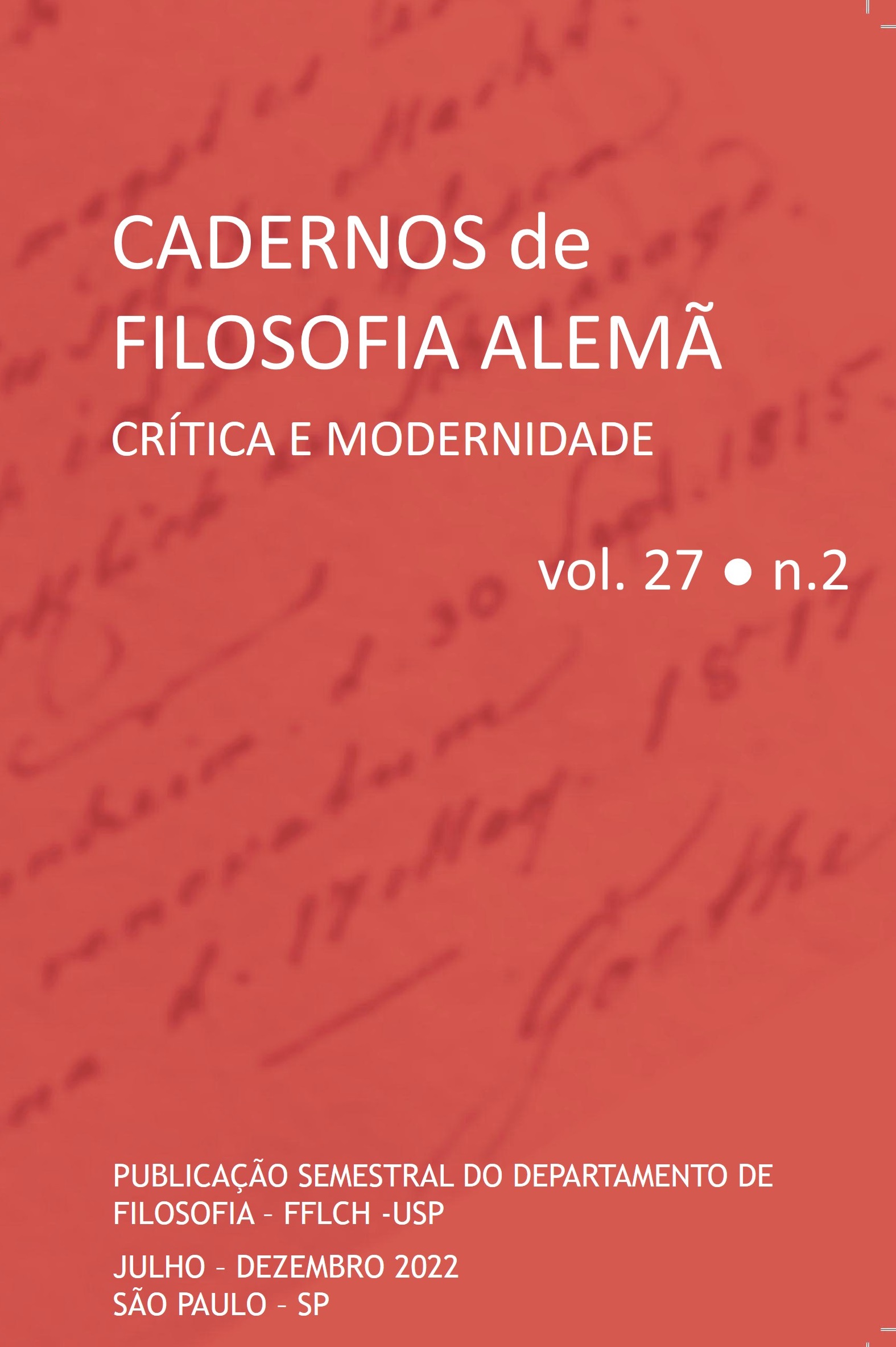The flower and the word: on the language of nature in Hölderlin and Heidegger
DOI:
https://doi.org/10.11606/issn.2318-9800.v27i2p13-30Keywords:
Nature, Language, Heidegger, HölderlinAbstract
The article defends the hypothesis of a language of nature from the ontological interpretation of Hölderlin’s poetry, contrary to the aesthetic interpretation made by Benjamin and accepted by Adorno. Heidegger’s exegesis of the Greek φύσις, which he compares to that of Hölderlin, will be the guiding thread both to differentiate the ontological reading from the aesthetic reading and to defend the possibility of nature speaking to the poet’s heart in a pre-discursive way. The article ends with the analysis of the Angelus Silesius mystical poem, whose objective is to reaffirm this hypothesis and not defend a mystique in Heidegger or in Hölderlin.
Downloads
References
Abrams, M. H. (1971). The Mirror and the Lamp: romantic theory and the critical tradition. New York: Oxford University Press.
Adorno, T. W. (1973). Notas de literatura. Trad. Celeste Aída Galeão e Idalina Azevedo da Silva. Rio de Janeiro: Edições Tempo Brasileiro.
Allemann, B. (1965). Hölderlin y Heidegger. Trad. Eduardo Garcia Belsunce. Argentina: Compañia General Fabril Editora, S.A.
Benjamin, W. (2013). Escritos sobre mito e linguagem (1915-1921). Organização, apresentação e notas de Jeanne Marie Gagnebin. Trad. Susana Kampff Lages e Ernani Chaves. 2.ed. São Paulo: Duas Cidades; Editora 34.
Borges-Duarte, I. (2021). Cuidado e afectividade em Heidegger e na análise existencial fenomenológica. Rio de Janeiro: Ed. PUC-Rio: NAU Editora; Lisboa: Editora Documenta.
Caputo, J. D. (1986). The mystical element in Heidegger’s thought. New York University Press.
Castro, C. (2007) “Sobre o tapete da verdade: Benjamin e Hölderlin. In: Viso: Cadernos de estética aplicada, 1 (2), 47-57.
Dastur, F. (1997). Hölderlin: le retournement natal. Paris: Encre Marine.
Gadamer, H-G. (2004). Poema y diálogo. Trad. Daniel Najmías y Juan Navarro. Bracelona: Editorial Gedesia, S.A.
Gosetti-Ferencei, J. A. (2004). Heidegger, Hölderlin and the Subject of Poetic Language: Toward a New Poetics of Dasein. New York: Fordham University Press.
Heidegger, M. (1978). Metaphysische Anfangsgründe der Logik im Ausgang von Leibniz. Vittorio Klostermann – Frankfurt am Main.
Heidegger, M. (1980). Hölderlins Hymnen “Germanien” und “Der Rhein”. Vittorio Klostermann – Frankfurt am Main.
Heidegger, M. (1981). Erläuterungen zu Hölderlins Dichtung. Vittorio Klostermann - Frankfurt am Main.
Heidegger, M. (1983). Die Grundbegriff der Metaphysik: Welt – endlichkeit – Einsamkeit. Vittorio Klostermann – Frankfurt am Main.
Heidegger, M. (1997a). Der Satz vom Grund. Vittorio Klostermann – Frankfurt am Main.
Heidegger, M. (1997b). Holzwege. Vittorio Klostermann – Frankfurt am Main.
Hölderlin, F. (1990). Correspondência completa. Introducción e traducción de Helena Cortés y Arturo Leyte. Madrid: Ediciónes Hiperión, SL.
Hölderlin, F. (1995). Poesía completa: Edición Bilingüe. Trad. Federico Gorbea. Barcelona: Ediciones 29.
Hölderlin, F. (2008). “Observações sobre Édipo; Observações sobre Antígona”. In: Beaufret, J. Hölderlin e Sófocles. Trad. Pedro Süssekind e Roberto Machado. Rio de Janeiro: Jorge Zahar Ed.
Taminiaux, J. (1995). Leituras da ontologia fundamental: ensaios sobre Heidegger. Trad. João Carlos Paz. Lisboa: Instituto Piaget.
Vaccari, U. R. (2019). “A morte do poeta: Benjamin leitor de Hölderlin”. In: Discurso, 49 (2), 253-268.
Downloads
Published
Issue
Section
License
Copyright (c) 2022 João Evangelista Fernandes

This work is licensed under a Creative Commons Attribution-NoDerivatives 4.0 International License.
Information and conceptions on the texts are complete responsibility of the authors.
All the articles submitted before July 5th 2018 and those published after July 2021 are licensed under a CC BY-NC-ND license – except those published between the aforementioned dates, which are under the CC BY-NC-SA license. The permission for the translation of the material published under the license CC BY-NC-ND by third parts can be obtained with the consent of the author.
Open access policies - Diadorim
Rules applied before July 5th 2018:
Presenting a submission to our Editorial Board implies granting priority of publication for “Cadernos de filosofia alemã”, as well as transferring the copyright of texts (once published), which will be reproduced only with the manifest authorization of the editors. Authors keep the right to reuse the texts published in future editions of their work, without paying any fees to "Cadernos”. We will not grant the permission to re-edit or translate the texts for third parts without agreement of the author.


